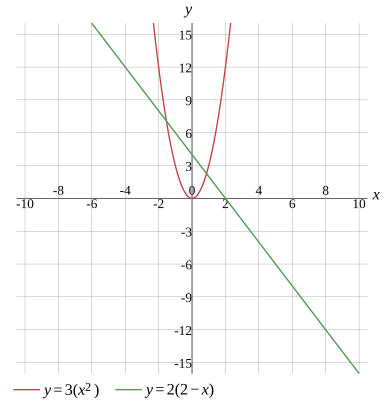Question
Solve the quadratic equation
Solve using the quadratic formula
Solve by completing the square
Solve using the PQ formula
x1=−31+13,x2=3−1+13
Alternative Form
x1≈−1.535184,x2≈0.868517
Evaluate
3x2=2(2−x)
Expand the expression
More Steps


Evaluate
2(2−x)
Apply the distributive property
2×2−2x
Multiply the numbers
4−2x
3x2=4−2x
Move the expression to the left side
3x2−4+2x=0
Rewrite in standard form
3x2+2x−4=0
Substitute a=3,b=2 and c=−4 into the quadratic formula x=2a−b±b2−4ac
x=2×3−2±22−4×3(−4)
Simplify the expression
x=6−2±22−4×3(−4)
Simplify the expression
More Steps


Evaluate
22−4×3(−4)
Multiply
More Steps


Multiply the terms
4×3(−4)
Rewrite the expression
−4×3×4
Multiply the terms
−48
22−(−48)
If a negative sign or a subtraction symbol appears outside parentheses, remove the parentheses and change the sign of every term within the parentheses
22+48
Evaluate the power
4+48
Add the numbers
52
x=6−2±52
Simplify the radical expression
More Steps


Evaluate
52
Write the expression as a product where the root of one of the factors can be evaluated
4×13
Write the number in exponential form with the base of 2
22×13
The root of a product is equal to the product of the roots of each factor
22×13
Reduce the index of the radical and exponent with 2
213
x=6−2±213
Separate the equation into 2 possible cases
x=6−2+213x=6−2−213
Simplify the expression
More Steps


Evaluate
x=6−2+213
Divide the terms
More Steps


Evaluate
6−2+213
Rewrite the expression
62(−1+13)
Cancel out the common factor 2
3−1+13
x=3−1+13
x=3−1+13x=6−2−213
Simplify the expression
More Steps


Evaluate
x=6−2−213
Divide the terms
More Steps


Evaluate
6−2−213
Rewrite the expression
62(−1−13)
Cancel out the common factor 2
3−1−13
Use b−a=−ba=−ba to rewrite the fraction
−31+13
x=−31+13
x=3−1+13x=−31+13
Solution
x1=−31+13,x2=3−1+13
Alternative Form
x1≈−1.535184,x2≈0.868517
Show Solution

Graph
